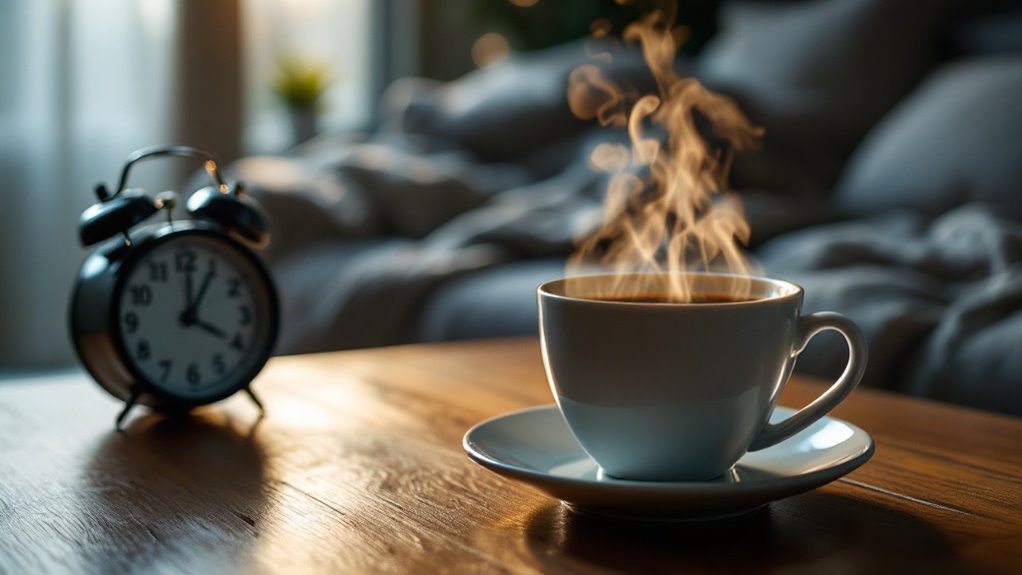



Coffee might just be the ultimate thief of your dreams—literally. When you drink it, caffeine blocks adenosine receptors in your brain, delaying the onset of REM sleep and shortening its duration. This disruption doesn't just leave you tossing and turning; it messes with your brain's ability to process emotions, consolidate memories, and recharge for the next day. Even if you sip your last cup hours before bed, the effects linger, quietly sabotaging your sleep quality. But what does this mean for your long-term cognitive health? The answer might make you rethink that afternoon espresso.
Key Takeaways
- Caffeine delays REM sleep onset by up to two hours, disrupting natural sleep patterns.
- Chronic caffeine use reduces REM sleep duration and perceived sleep quality.
- Caffeine increases brain blood flow during REM sleep, potentially aiding waste clearance.
- Consuming caffeine within 6 hours of bedtime significantly reduces REM sleep and total sleep time.
- Long-term caffeine consumption alters sleep architecture, impairing memory consolidation and emotional processing during REM sleep.
The Role of REM Sleep in Cognitive Function
REM sleep plays a critical role in cognitive function, particularly in memory consolidation and emotional processing. During REM sleep, your brain integrates new information, strengthening procedural and emotional memories, which enhances learning and problem-solving abilities. Increased brain activity in regions linked to emotional regulation and decision-making occurs during this stage, helping you manage stress and maintain mood stability. Disruption of REM sleep can impair cognitive performance, reducing attention, creativity, and overall mental sharpness. Studies show that REM sleep deprivation heightens susceptibility to stress and anxiety, further impacting emotional regulation. By supporting memory consolidation and optimizing brain activity, REM sleep guarantees you retain information, solve complex tasks, and maintain emotional balance, all of which are essential for peak cognitive performance. Prioritizing REM sleep is key to sustaining these critical functions.
How Caffeine Delays REM Sleep Onset
Caffeine delays REM sleep onset by up to two hours, disrupting your natural sleep architecture and shifting sleep timing relative to the light-dark cycle. By blocking adenosine receptors, it interferes with genetically programmed sleep patterns, particularly in chronic consumers. This delay can reduce perceived sleep quality, as REM sleep, essential for memory consolidation, is pushed later into your sleep cycle.
Caffeine's REM Sleep Delay
Although REM sleep is essential for memory consolidation and cognitive function, consuming caffeine can markedly delay its onset. Caffeine disrupts sleep patterns by inhibiting adenosine receptors, which typically promote sleepiness. Studies show chronic caffeine consumption delays REM sleep onset by up to two hours, particularly in mice, and eliminates natural "siesta" phases. This delay shifts sleep timing relative to the light-dark cycle, altering the brain's natural rhythms. REM sleep, characterized by increased brain blood flow, is critical for cognitive functions, but caffeine's interference can impair these processes. In humans, even consuming caffeine six hours before bedtime disrupts sleep architecture, delaying REM sleep onset. By altering these patterns, caffeine compromises the restorative benefits of REM sleep, potentially affecting memory consolidation and overall cognitive performance.
Impact on Sleep Architecture
The timing and structure of sleep are substantially influenced by caffeine's effects on adenosine receptors, which play a key role in regulating sleep-wake cycles. When you consume caffeine, it delays REM sleep onset by up to two hours, disrupting the natural progression of sleep stages. This delay consolidates wakefulness and shifts sleep architecture, reducing the time spent in restorative REM sleep. Chronic caffeine consumption further alters the timing of REM sleep relative to the light-dark cycle, potentially leading to long-term sleep disturbances. Additionally, caffeine increases brain blood flow during REM sleep, which may impact its function. If you consume caffeine close to bedtime, these effects can compound, further delaying REM sleep onset and reducing overall sleep quality.
Genetic Sleep Pattern Disruption
When consumed, caffeine disrupts genetically programmed sleep patterns by delaying REM sleep onset, a phenomenon observed in both mice and humans. In mice, chronic caffeine consumption eliminates the natural "siesta" phase, directly impacting REM sleep timing. This delay shifts sleep relative to the light-dark cycle, potentially altering REM cycles in individuals with a genetic predisposition to specific sleep patterns. While mice compensate by sleeping longer and more solidly, humans with fixed sleep schedules may experience persistent sleep disruption. Research suggests caffeine's effects on REM sleep onset are more pronounced in those with certain genetically programmed sleep patterns, highlighting the interplay between caffeine, sleep onset, and genetic factors. Understanding this relationship is vital for managing sleep schedules and mitigating chronic sleep disruption.
Caffeine's Impact on Sleep Architecture
Caffeine substantially alters sleep architecture, delaying REM sleep onset by up to two hours, as demonstrated in mice studies. Chronic caffeine consumption reduces total sleep time by 45 minutes and decreases sleep efficiency by 7%, disrupting the natural progression of sleep stages. You'll experience a reduction in deep sleep (N3 and N4) duration by 11.4 minutes, while light sleep (N1) proportion increases by 1.7%. This shift in sleep architecture consolidates wakefulness and delays sleep onset, particularly affecting the siesta phase observed in mice. Additionally, caffeine increases brain blood flow during both non-REM and REM sleep, which may support waste clearance and neuroprotection. These changes highlight caffeine's profound impact on sleep quality and structure, even beyond its immediate stimulant effects.
Brain Blood Flow Changes During REM Sleep
While REM sleep is often linked to vivid dreaming, it's also a critical phase for brain blood flow, which surges substantially during this stage. This increased brain blood flow supports cognitive functions, memory consolidation, and neuroprotection. Caffeine consumption reduces blood flow during wakefulness but enhances it during sleep phases, including REM sleep. This boost in brain blood flow during REM sleep may improve metabolic waste clearance, aiding in brain repair and overall brain health. Chronic caffeine use further amplifies this effect, potentially optimizing the brain's ability to clear toxins and maintain function. By augmenting brain blood flow during REM sleep, caffeine may indirectly support processes critical for long-term brain health, even as it alters sleep architecture.
Long-Term Effects of Chronic Caffeine Use
Although chronic caffeine use can enhance brain blood flow during sleep, it substantially disrupts natural sleep architecture over time. Regular consumption delays REM sleep onset by up to two hours, altering genetically programmed sleep patterns and reducing restorative sleep quality. This delayed onset shifts your sleep timing relative to the light-dark cycle, leading to longer but less efficient sleep. Chronic caffeine use also eliminates natural "siesta" phases, consolidating wakefulness and further fragmenting sleep architecture. While increased brain blood flow may improve waste clearance during non-REM and REM sleep, the long-term effects include persistent disruptions to sleep patterns. Studies in mice show that daily caffeine abolishes genetically programmed sleep, suggesting similar impacts in humans. Over time, these changes can compromise your ability to achieve deep, restorative sleep.
Optimal Timing for Coffee Consumption
The timing of coffee consumption plays a significant role in mitigating its impact on sleep architecture, particularly REM sleep. To minimize disruptions, avoid caffeine intake at least 6 hours before bedtime, as it delays sleep onset and reduces total sleep time by up to 1.2 hours. For ideal sleep efficiency and preservation of deep sleep stages, consume caffeine no later than 8.8 hours before bedtime. Pre-workout supplements with caffeine should be taken at least 13.2 hours prior to sleep to prevent prolonged sleep latency and increased wakefulness during sleep. Late-day caffeine consumption, even 6 hours before bedtime, can reduce total sleep time by 41 minutes and elevate wakefulness. Aligning caffeine intake with circadian rhythms, such as in the morning or early afternoon, helps safeguard REM sleep and overall sleep quality.
Strategies to Minimize Caffeine's Sleep Disruption
To minimize caffeine's impact on sleep, you should avoid consuming it at least 6 hours before bedtime, as even intake within this window can reduce total sleep time by 41 minutes and increase wakefulness. The half-life of caffeine is approximately 5 hours, meaning it takes this long for your body to eliminate half of the consumed caffeine. Consuming caffeine close to bedtime disrupts sleep quality and reduces sleep duration, making it harder to fall asleep. Limit daily caffeine consumption to 400 milligrams or less to avoid prolonged sleep disturbances. Gradually reduce intake if you notice reduced total sleep time, as abrupt cessation can cause withdrawal symptoms. Track your caffeine habits and sleep patterns to determine the latest safe consumption time prior to bedtime, ensuring better sleep quality.
Disclosure: As an Amazon Associate, I earn from qualifying purchases.





